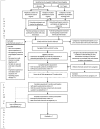Guided internet-administered self-help to reduce symptoms of anxiety and depression among adolescents and young adults diagnosed with cancer during adolescence (U-CARE: YoungCan): a study protocol for a feasibility trial
- PMID: 28132011
- PMCID: PMC5278290
- DOI: 10.1136/bmjopen-2016-013906
Guided internet-administered self-help to reduce symptoms of anxiety and depression among adolescents and young adults diagnosed with cancer during adolescence (U-CARE: YoungCan): a study protocol for a feasibility trial
Abstract
Introduction: A subgroup of adolescents and young adults diagnosed with cancer during adolescence reports elevated levels of anxiety and depressive symptoms and unmet needs for psychological support. Evidence-based psychological treatments tailored for this population are lacking. This protocol describes a feasibility study of a guided-internet-administered self-help programme (YoungCan) primarily targeting symptoms of anxiety and depression among young persons diagnosed with cancer during adolescence and of the planned study procedures for a future controlled trial.
Methods/analysis: The study is an uncontrolled feasibility trial with a pre-post and 3-month follow-up design. Potential participants aged 15-25 years, diagnosed with cancer during adolescence, will be identified via the Swedish Childhood Cancer Registry. 30 participants will be included. Participants will receive YoungCan, a 12-week therapist-guided, internet-administered self-help programme consisting primarily of cognitive-behavioural therapy organised into individually assigned modules targeting depressive symptoms, worry and anxiety, body dissatisfaction and post-traumatic stress. Interactive peer support and psychoeducative functions are also available. Feasibility outcomes include: recruitment and eligibility criteria; data collection; attrition; resources needed to complete the study and programme; safety procedures; participants' and therapists' adherence to the programme; and participants' acceptability of the programme and study methodology. Additionally, mechanisms of impact will be explored and data regarding symptoms of anxiety, depression, post-traumatic stress, body dissatisfaction, reactions to social interactions, quality of life, axis I diagnoses according to the Mini International Neuropsychiatric Interview and healthcare service use will be collected. Exploratory analyses of changes in targeted outcomes will be conducted.
Ethics/dissemination: This feasibility protocol was approved by the Regional Ethical Review Board in Uppsala, Sweden (ref: 2016/210). Findings will be disseminated to relevant research, clinical, health service and patient communities through publications in peer-reviewed and popular science journals and presentations at scientific and clinical conferences.
Trial registration number: ISRCTN97835363.
Keywords: adolescence; cognitive behavioural therapy; feasibility study; neoplasms; psychological treatment.
Published by the BMJ Publishing Group Limited. For permission to use (where not already granted under a licence) please go to http://www.bmj.com/company/products-services/rights-and-licensing/.
Conflict of interest statement
Conflicts of Interest: None declared.
Figures
References
-
- D'Agostino NM, Penney A, Zebrack B. Providing developmentally appropriate psychosocial care to adolescent and young adult cancer survivors. Cancer 2011;117(10 Suppl):2329–34. - PubMed
-
- Arnett JJ. Emerging adulthood. A theory of development from the late teens through the twenties. Am Psychol 2000;55:469–80. - PubMed
MeSH terms
LinkOut - more resources
Full Text Sources
Other Literature Sources
Medical

